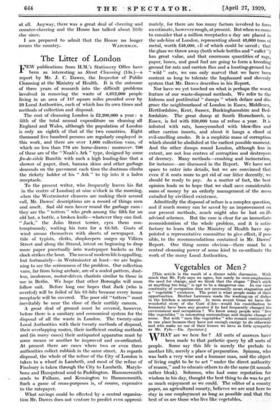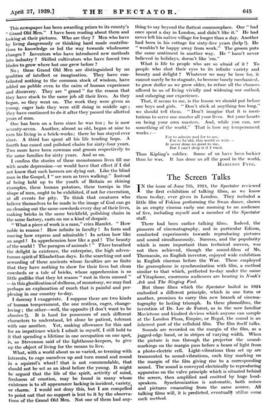Vegetables or Men ?
[This article is the result of a dinner table discussion. With much that Mr. Fyfe says we agree, but surely he over-emphasizes the need for change, and we think that the slogan " Don't stick at anything too long," is apt to be a dangerous one. In our view continuity of occupation does not necessarily mean stagnation and a " vegetable " existence. The point is what people make of their opportunities. Brother Lawrence made the washing-up of dishes in the kitchen a sacrament. In more recent times we have the wonderful story of the Cure d'Ats—would his contribution to humanity have been any greater if he had frequently changed his environment and occupation ? We know many people who live like vegetables " in interesting surroundings and despite change of scene. But with " men like vegetables " who remain continuously in one place because they have not enough energy to do' otherwise and who make no use of their leisure we have as little sympathy as Mr. Fyfe.—En. Spectator.]
WHAT are we here for ? All sorts of answers have been made to that pathetic query by all sorts of people. Some say this life is merely the prelude to another life, merely a place of preparation. Spinoza, who was both a very wise and a humane man, said the object of living ought to be to act " under the direct authority. of reason," and to educate others to do the same fit sounds rather bleak). Solomon, who had some reputation for wisdom in his day,-thought the best thing to do was, to get as much enjoyment as we•could. The editor of a county paper, an agricultural county, believes we are sent here to stay in one employment as long as possible and that the best of us are those who live like vegetables. This newspaper has been awarding prizes to its county's " Grand Old Men." I have been reading about them and looking at their pictures. Who are they ? Men who have by living dangerously or thinking hard made contribu- tions to knowledge or led the way towards wholesome changes ? Inventors who have introduced new methods into industry ? Skilled cultivators who have forced two blades to grow where but one grew before ?
No ; these Grand Old Men are distinguished by no qualities of intellect or imagination. They have con- tributed nothing to the common stock of wisdom, have added no pebble even to the cairn of human experience and discovery. They are grand '? for the reason that they have stuck to the same job all their lives. As they began, so they went on. The work they were given as young, eager lads they were still doing in middle age ; they have continued to do it after they passed the allotted years of man.
One has been on a farm since he was ten ; he is now seventy-seven. Another, almost as old, began at nine to earn his living in a brick-works ; there he has stayed ever since. A third has spent all his life tending hops. A fourth has caned and polished chairs for sixty-four years. Two more have been cowman and groom respectively to the same families for sixty years. And so on.
I confess the stories of these monotonous lives fill me with acute depression—or would have that effect if I did not know that such horrors are dying out. Like the blind man in the Gospel, I " see men as trees walking." Instead of being held up to the youth of Britain as shining examples, these human potatoes, these turnips in the shape of men, ought to be exhibited, if not for execration, at all events for pity. To think that creatures who believe themselves to be made in the image of God can go on cleaning out the same cowsheds every day of their lives, making bricks in the same brickfield, polishing chairs in the same factory, casts on me a kind of despair.
" What a piece of work is a man," cries Hamlet. " How noble in reason ! How infinite in faculty ! In form and moving how express and admirable ! In action how like an angel 1 In apprehension how like a god ! The beauty of the world ! The paragon of animals ! " There breathed the delight in existence, the enterprise, the high adven- turous spirit of Elizabethan days. In the searching out and rewarding of these ancients whose faculties are so finite that they have nothing to show for their lives but clean cowsheds or a tale of bricks, whose apprehension is so little godlike that they let reason " rust in them unused " —in this glorification of dullness, of monotony, we may find perhaps an explanation of much that is painful and per- plexing in our country to-day.
I daresa.y I exaggerate. I suppose there are two kinds of human temperament, the one restless, eager, change- loving ; the other—well, the opposite (I don't want to be abusive I). It is hard for possessors of such different characters to understand, let alone be patient, tolerant with one another. Yet, making allowance for this and for an impatience which I admit in myself, I still hold to it that spending a lifetime in one occupation on one spot, is, as Stevenson said of the lighthouse-keepers, to give tip the object of living for the means to live.
What, with a world about us so varied, so teeming with interests, to cage ourselves up and turn round and round in a squirrel's wheel ! that is not commendable, that should not be set as an ideal before the young. It might be argued that the life of the spirit, activity of mind, freshness of emotion, may be found in many whose existence is to all appearance lacking in incident, variety, or charm. I would not deny this, but I am compelled to point out that no support is lent to it by the observa- tions of the Grand Old Men. Not one of them had any- thing to say beyond the flattest commonplace. One " had once spent a day 'in London, and didn't like it." He had never left his native village for longer than a day. Another had been in his cottage for sixty-five years (help I). He " wouldn't be happy away from work." The groom puts the same sentiment in another way. He " hasn't never believed in holidays, doesn't like 'em."
What is life to people who are so afraid of it ? To people who shut their eyes to its infinite variety and beauty and delight ? Whatever we may be here for, it cannot surely be to stagnate, to become basely mechanical, to grow duller as we grow older, to refuse all the chances offered to us of living vividly and widening our outlook and enlarging our experience.
That, it seems to me, is the lesson we should put before our boys and girls. " Don't stick at anything too long," we should tell them. " Don't imagine that it is meri- torious to serve one master all your lives. Set your hearts on being your own masters. And, while you can, see something of the world." That is how my temperament works :—
For to admire and for to see, For to be'old, this world so wide— It never done no good to me, But I can't drop it if I tried.
Thus Kipling's soldier. Some of us have been luckier than he was. It has done us all the good in the world.
HAMILTON FIFE.









































 Previous page
Previous page